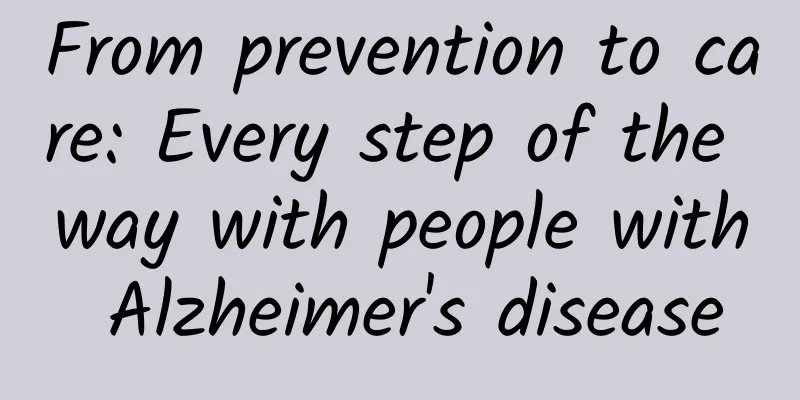From prevention to care: Every step of the way with people with Alzheimer's disease

|
Author: Zhang Hui, deputy chief physician, Peking University Third Hospital Reviewer: Fan Dongsheng, Chief Physician, Peking University Third Hospital Alzheimer's disease, a disease that gradually erodes human memory and cognitive ability, not only brings deep pain to the patients themselves, but also poses a huge challenge to their families and society. However, through scientific prevention methods and meticulous care, we can walk with Alzheimer's patients and give them the greatest support and care. 1. How to prevent Alzheimer’s disease? Figure 1 Copyright image, no permission to reprint Alzheimer's disease is not a sudden disease, but gradually worsens. In the absence of specific treatment drugs, daily prevention is very important. What specific preventive measures can improve and delay the onset of Alzheimer's disease? ☆ Eat more foods rich in choline, including soy products, eggs, peanuts, walnuts, deep-sea fish, lean meat, etc. When feeding the patient, pay attention to avoid aspiration and choking. ☆ To prevent constipation, you need to achieve a balanced nutrition and reduce the decomposition and absorption of toxic substances by intestinal bacteria. ☆ Be active and move your wrists and fingers regularly, such as practicing writing, doing handicrafts, turning walnuts, etc., to delay the deterioration of brain function. ☆ Use your brain frequently, try to learn and accept new things around you, and thinking more can help stimulate brain cells. ☆ Doing moderate exercise can help improve your immunity and improve your mood. Figure 2 Copyright image, no permission to reprint Alzheimer's disease does not occur suddenly. Paying attention to the disease in its early stages and removing the triggers in time can prevent forgetfulness in old age and delay the onset of Alzheimer's disease. Although Alzheimer's disease cannot be cured at present, a good lifestyle may reduce the risk of its occurrence. As younger generations, we can chat with our elders more often in daily life so that they will not feel lonely and bored; pay more attention to the diet and daily life of the elders, let them participate in more social activities, and enrich their later life; create a harmonious family atmosphere so that the elders can maintain a happy mood. Figure 3 Copyright image, no permission to reprint 2. How should family members care for patients with Alzheimer’s disease? At different stages of Alzheimer's disease, the patient's symptoms, living abilities and other aspects are different, and family members need to provide care based on their different needs. Figure 4 Copyright image, no permission to reprint ☆ In the early stage of the disease, patients often have memory loss as the main symptom, easily lose things, shopping, doing housework, etc. gradually become difficult, interest decreases, and they are not willing to communicate with others. Family members should spend more time with patients, chat with them, and recall the past with them, such as looking at old photos, listening to the patients' stories, etc.; arrange the daily routine of patients, encourage patients to do things they can do as much as possible by themselves; arrange more social activities for patients, such as gathering with old friends, visiting relatives and friends, and encourage patients to contact the outside world more; encourage patients to continue their previous hobbies, such as listening to music, painting, etc.; the home should be arranged safely and comfortably; prepare nutritious and easily digestible food for patients; supervise patients to take medication correctly and on time. Figure 5 Copyright image, no permission to reprint ☆ In the middle stage of the disease, the patient's language expression ability, comprehension ability and spatial orientation sense will further decline, and more mental and behavioral problems will occur, such as emotional instability, suspicion and hallucinations, and sometimes they will not recognize their family members. At this stage, family members should try their best to maintain the regularity of the patient's daily life, guide and help the patient to do simple things; listen to the patient patiently, communicate with him in simple and easy-to-understand language, and use more body language; if the patient loses his temper, first understand the specific reason, do not argue with him directly, you can divert his attention and do something else; the patient's daily living ability gradually declines, and family members should assist the patient in bathing, dressing, and defecating and urinating; when the patient goes out, try to have someone accompany him to prevent him from getting lost. Figure 6 Copyrighted images are not authorized for reproduction ☆ In the late stage of the disease, the patient can no longer take care of himself, and may even be bedridden. He needs the care of his family for eating, defecation, and urination. At this time, family members should help the patient eat safely, pay attention to turning over and patting his back, keep him clean, and prevent infection, so that he can live as comfortably as possible in the final stage. Figure 7 Copyright image is not authorized for reproduction |
<<: A letter from the heart to its owner: Talking about sick sinus syndrome
>>: Tips for low-salt diet, making it delicious and healthy
Recommend
What underwear should I wear when I first develop
The growth from infancy to adolescence is the fas...
About simple ovarian cysts, all the details are here
Simple ovarian cyst is one of the common gynecolo...
What should I do if my right ovary is echoless?
Ovarian cyst is a common disease among women. The...
Is it a big deal if the white blood cell count is low during pregnancy?
Many pregnant women have a low white blood cell r...
How "anti-human" is the right-angle shoulder? Orthopedic doctors tell the truth...
Review | Li Nannan is the vice president of Hunan...
Is it normal to have irregular periods while breastfeeding?
Lactation is an important stage for women. During...
What to do if you don't fart during cesarean section
The first and most important thing after a cesare...
Suddenly I felt my heart skip a beat. Is it serious?
Heart-related problems Most people have a panic m...
What is lotus root? Can lotus root still be eaten after being eaten?
Lotus root belongs to the family Nelumbo. Lotus r...
Ovulation induction twins chance
In modern society, many parents hope to have twin...
A few simple tips to help girls grow taller
Most girls are relatively short, and many women w...
What is the difference between miscarriage symptoms and menstruation?
We all know that blood discharge occurs during me...
What are the methods to dispel wind during confinement?
During the confinement period, the mother's b...
Should I reply to the New Year's greetings sent to me by a group? How should I reply to the New Year's greetings sent by others?
China is a country of etiquette. When the Chinese...









